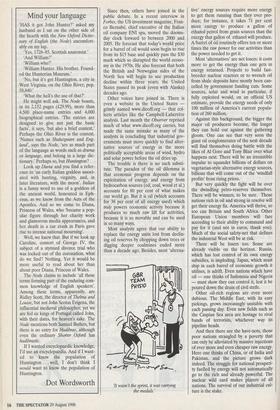Mind your language
`HAS it got John Hunter?' asked my husband as I sat on the other side of the hearth with the New Oxford Dictio- nary of English (the Node) uncomfort- ably on my lap.
`Yes, 1728-93, Scottish anatomist.' `And William?'
`William who?'
`William Hunter. His brother. Found- ed the Hunterian Museum.'
`No, but it's got Huntington, a city in West Virginia, on the Ohio River; pop. 58,840.'
`What the hell's the use of that?'
He might well ask. The Node boasts, in its 2,152 pages (U9.99), more than 4,500 place-name entries and 4,000 biographical entries. 'The entries are designed to give not just the basic facts', it says, tut also a brief context.'
Perhaps the Ohio River is the context. `Names such as Shakespeare and Eng- land', says the Node, 'are as much part of the language as words such as drama or language, and belong in a large dic- tionary.' Perhaps so, but Huntington?
Look up Diana and you find a refer- ence to 'an early Italian goddess associ- ated with hunting, virginity, and, in later literature, with the moon'. Italian is a funny word to use of a goddess of the ancient world, honoured in Eph- esus, as we know from the Acts of the Apostles. And so we come to Diana, Princess of Wales, who 'became a pop- ular figure through her charity work and glamorous media appearances, and her death in a car crash in Paris gave rise to intense national mourning'.
Well, we knew that. But if we look up Caroline, consort of George IV, the subject of a stymied divorce trial who was locked out of the coronation, what do we find? Nothing. Yet it would be more useful to read about her than about poor Diana, Princess of Wales.
The Node claims to include 'all those terms forming part of the enduring com- mon knowledge of English speakers'.
Among these terms, apparently, are Ridley Scott, the director of Thelma and Louise, but not John Scotus Erigena, the influential medieval philosopher; yet we are fed six kings of Portugal called John, with their dates, for heaven's sake. The Node mentions both Samuel Butlers, but there is no entry for Hudibras, although even the ordinary Shorter Oxford has hudibrastic.
If I wanted encyclopaedic knowledge, I'd use an encyclopaedia. And if I want- ed to know the population of Huntington . . . well, I don't think I would want to know the population of Huntington.
Dot Wordsworth


























































 Previous page
Previous page